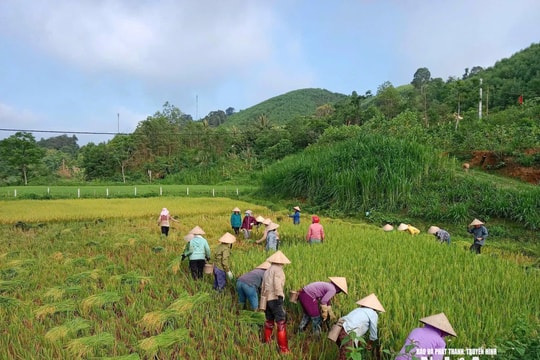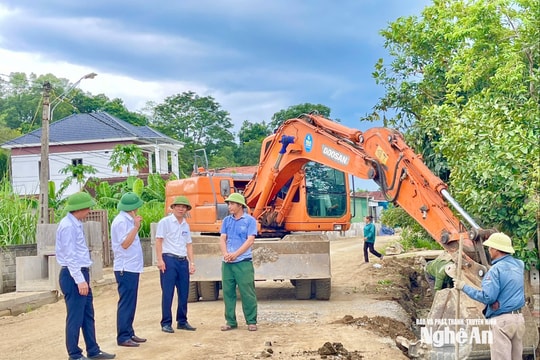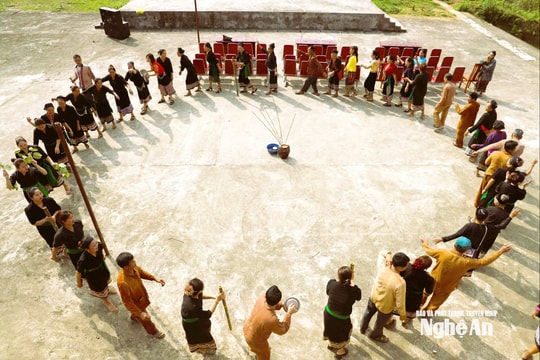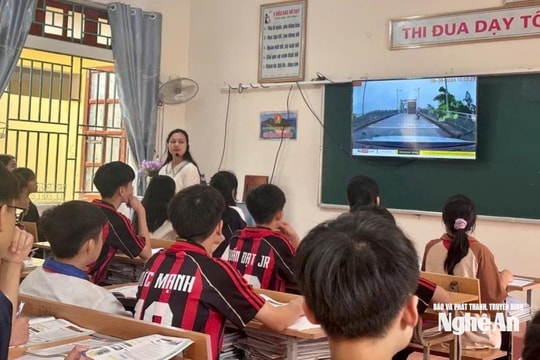Uncle Ho with the peasant class
(Baonghean.vn) - During his lifetime, President Ho Chi Minh always paid attention to all social classes, in which he paid special attention to the peasant class. He traveled to find a way to save the country for the independence of the nation, so that "farmers have fields", so that "land belongs to the farmers", so that "everyone has food to eat, clothes to wear, and education".
After 30 years of wandering in search of a way to save the country, in the spring of 1941, Uncle Ho returned to the Fatherland, directly leading the Vietnamese revolution. Right from these first days, he lived with the farmers in the mountainous region of Cao Bang and enlightened them to make revolution. At the same time, those poor and oppressed farmers sheltered and helped him and his comrades. The place name Pac Bo, Cao Bang had the honor of becoming the first "headquarters" of our country's revolution.
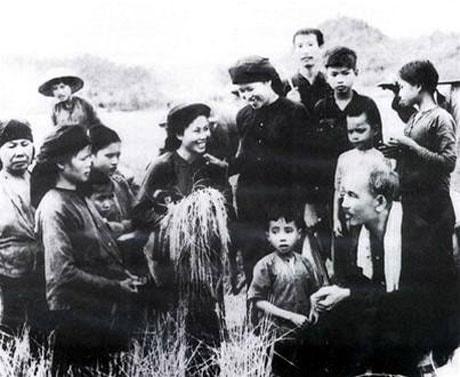 |
| Uncle Ho visited farmers harvesting rice in the fields of Hung Son commune, Dai Tu district, Thai Nguyen. |
From birth to his school years, Uncle Ho lived in the countryside of Nghe An among the poor people who worked day and night in the fields, so he deeply understood the suffering and hardship of farmers - those who were not afraid of hardship and sacrifice, actively increased production, and contributed human and material resources to the sacred resistance of the nation.
Therefore, among the many tasks to build the young government that had just won after the August Revolution, the Party Central Committee and Uncle Ho immediately set out the task of fighting three enemies: hunger, illiteracy and foreign invaders, in which hunger was ranked first. Because the famine of 1945 had taken the lives of more than 3 million people and left millions of others still in poverty. As President, Uncle Ho often went to localities such as Ninh Binh, Thai Binh, Ha Tay... to urge famine relief, organize increased production...
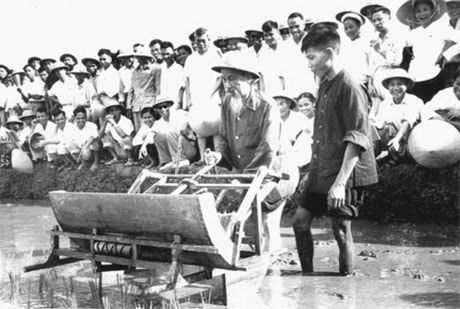 |
| Uncle Ho tested the improved rice transplanter at the Rice Cultivation Experimental Farm of the Hanoi Department of Agriculture and Forestry. |
At every meal, Uncle Ho paid attention not to drop a single grain of rice. He considered wasting each grain of rice as wasting the sweat and effort of his compatriots and comrades. In his Will, he proposed “to exempt agricultural tax for one year for agricultural cooperatives to make the people happy, feel at ease, feel more excited, and boost production.”
When the American war of destruction in the North was fierce, Uncle Ho spent time going down to the cooperatives to visit and encourage farmers. The image of Uncle Ho rolling up his pants to wade in the fields, bailing water, and pedaling the water wheel to prevent flooding with the people are beautiful images in the hearts of the people.
When he heard that the Red River dike in the Hung Yen and Thai Binh areas had broken, Uncle Ho personally went down to inspect the damage recovery. He asked in detail how many people had been injured, and instructed them to first take care of food so that people would not go hungry, then to find a place to live and stabilize their lives, and to concentrate human and material resources to rebuild the broken dike. He promised that when the construction was finished, he would come down to visit.
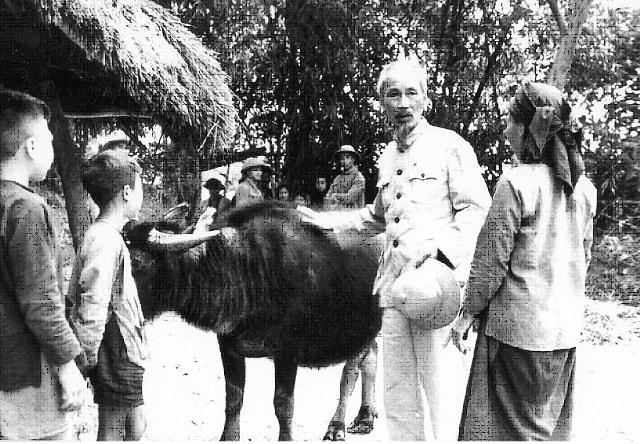 |
| Uncle Ho visited farmers in Hiep Hoa commune, Bac Giang, February 1955 |
Keeping his promise, 4 months later, Uncle Ho came down to attend the inauguration of the newly built dike section. He inspected the area where the new dike meets the old dike and reminded them that it needed to be reinforced to ensure safety. He praised the quick construction but the compaction was not yet tight, and needed to increase the force to compact it thoroughly to ensure long-term durability.
In the “Letter to Farmers to Compete in Cultivation” in February 1951, Uncle Ho wrote: “If food is sufficient, the army will be strong! Soldiers at the front compete to kill enemies and gain achievements, then the people in the rear must compete to increase production. Fields are battlefields, hoes and plows are weapons, farmers are soldiers, the rear competes with the front.” The letter showed Uncle Ho’s special concern for the peasant class and agricultural production.
When visiting the people, Uncle Ho did not use general words but was very specific, explaining each matter clearly, pointing out advantages to promote, and pointing out shortcomings to overcome. Standing before the people, Uncle Ho did not read a speech but spoke kindly and asked questions.
Once when he returned to Dai Nghia commune, Ha Dong, talking to the agricultural cooperative officials, Uncle Ho gave specific numbers that surprised the people. He said: The commune has 600 households but only raises 500 pigs, which is a small number, each household has less than one pig, and each household has only 10 chickens and ducks on average, so the commune must promote livestock farming...
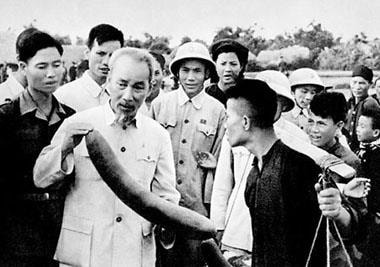 |
| Farmers of Ai Quoc commune (Hai Hung) reported production results to Uncle Ho (1958) |
From specific matters, Uncle Ho generalized: developing the collective economy but must develop the economy of the cooperative members' families appropriately. He pointed out the reason: valuing rice production is good, but farmers still underestimate crops and industrial plants. Because of underestimating crops, livestock farming cannot develop...
In his final years, Uncle Ho still spent a lot of time working with comrades in charge of agriculture. At Politburo meetings or working sessions on agriculture, Uncle Ho often mentioned the Cooperative Charter. He said: Workers have an anniversary, farmers must also have an anniversary, so the date of promulgation of the Cooperative Charter should be the anniversary for farmers. He instructed to write the Charter so that even less educated farmers could understand it. After reading the draft, Uncle Ho said this was for cadres, for cooperative members it should be written more concisely and easier to understand...
Uncle read and edited very carefully, and wherever the words were complicated and difficult to understand, Uncle changed them. The order of the chapters in Roman numerals was changed to “Chapter One… Two…”. The sentence “The State wholeheartedly helps” was removed because it was redundant. The sentence “Cooperative members must contribute land, buffaloes, cows, and main tools” was changed to: “Cooperative members must contribute land, contribute shares, leave buffaloes, cows, and main tools”. The word “leave” has both affection and meaning between the cooperative members and the cooperative.
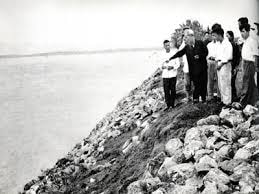 |
| Uncle Ho visited the embankment protecting the Da River in Co Do, Ba Vi district, Ha Tay province (July 8, 1958) |
During the Politburo meeting on agriculture, Uncle Ho suggested: "The accumulation fund of about 7-10% of the cooperative's income is too high, people's living standards are still low, so we should focus on raising their living standards." The Politburo agreed to only keep the accumulation fund at 5-10%. Then, Uncle Ho requested to convert the content of the Charter into a song broadcast on the radio so that people can easily memorize and follow it.
In the supplement to the Will written by Uncle Ho in May 1968, he devoted a paragraph to the Vietnamese peasant class. He wrote: “During the years of resistance against French colonialism, then against American imperialism, our people, especially peasants, have always been extremely loyal to our Party and Government, contributing money and people, willingly enduring all difficulties and hardships. Now that we have completely won, I propose to exempt agricultural tax for 1 year for agricultural cooperatives to make our people happy, feel at ease, feel more excited, and boost production.”
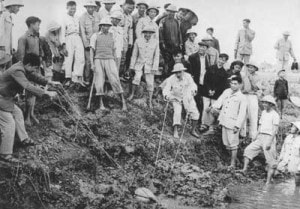 |
| Uncle Ho bailed water to fight drought with farmers in Quang To field, Dai Thanh commune, Thanh Tri district, Hanoi (January 12, 1958). |
Pursuant to His Will, the 8th National Assembly of the Socialist Republic of Vietnam, 7th session, issued a Resolution “Implementing agricultural tax exemption according to President Ho Chi Minh’s Will”. Exempting and reducing agricultural tax, gradually limiting and eliminating contributions in rural areas so that farmers have the conditions to reinvest in production is the policy of our Party and State, in accordance with His spirit and wishes.
Following Uncle Ho's words, the issue of agriculture - rural areas - farmers was put on the agenda and on August 5, 2008, Resolution No. 26-NQ/TW of the 7th Conference of the 10th Party Central Committee on agriculture, farmers and rural areas was issued, clearly defining "Farmers are the subject of the development process". Accordingly, a series of issues on agriculture - rural areas - farmers have become topical issues of the country.
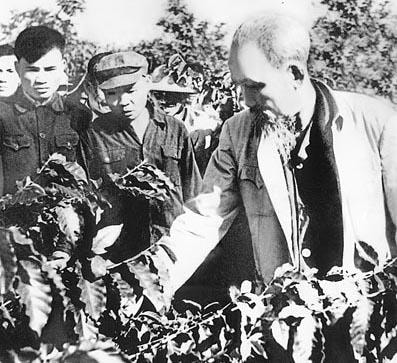 |
| Uncle Ho visited the coffee hill of Dong Hieu Farm, Nghia Dan district (Nghe An) |
Today, our country has become one of the leading rice exporters in the world. The lives of farmers have changed, their children have been educated and have knowledge. In that great joy, we remember our beloved Uncle Ho - the builder of the new Vietnam, the great leader of the Party and the nation, who spent his whole life caring for and being close to the farmers and rural areas of Vietnam. Uncle Ho will live forever in the hearts of the nation, in the hearts of the hardworking, simple and loyal farmers.
Peace
(Synthetic)
| RELATED NEWS |
|---|

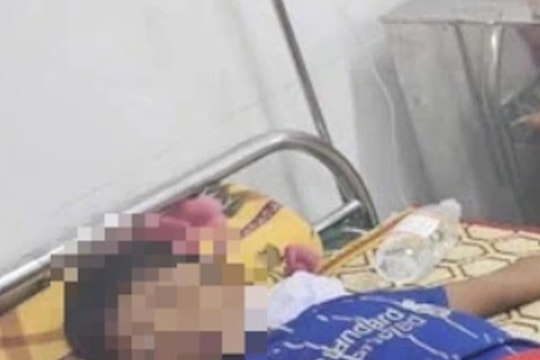
.jpg)

